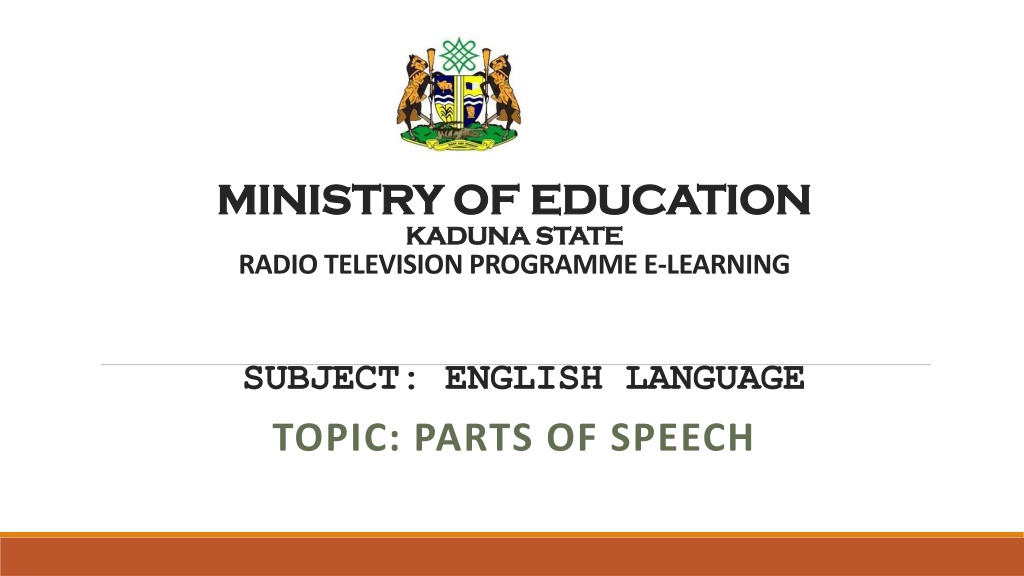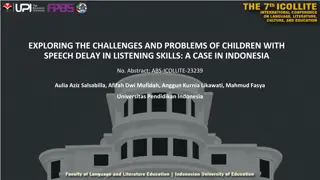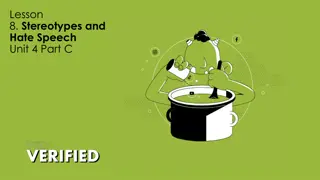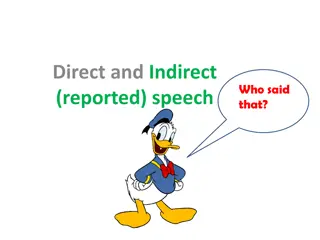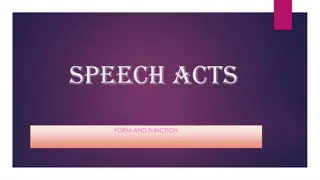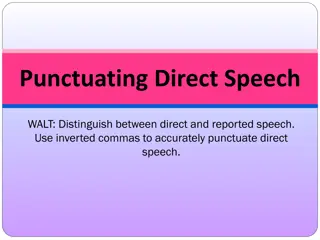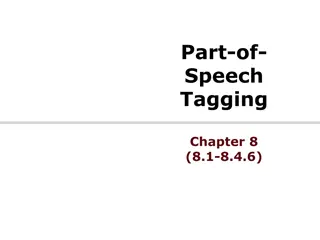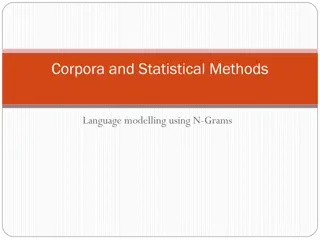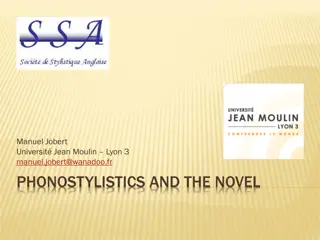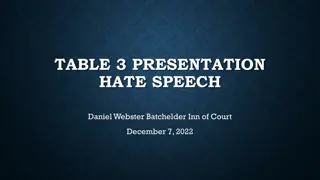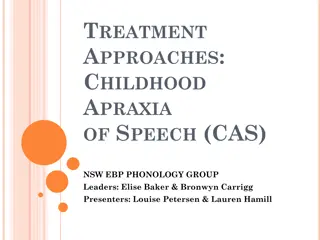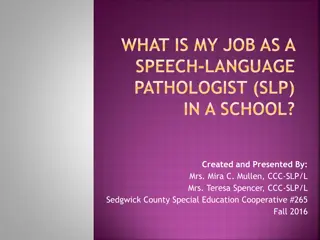Parts of Speech in English Language
Delve into an insightful exploration of the parts of speech in English language. Discover the classification of words into different categories such as nouns, pronouns, adjectives, verbs, adverbs, prepositions, conjunctions, and determiners. Learn about the various functions of nouns and how they can serve as subjects, objects, and more in a sentence.
Download Presentation

Please find below an Image/Link to download the presentation.
The content on the website is provided AS IS for your information and personal use only. It may not be sold, licensed, or shared on other websites without obtaining consent from the author.If you encounter any issues during the download, it is possible that the publisher has removed the file from their server.
You are allowed to download the files provided on this website for personal or commercial use, subject to the condition that they are used lawfully. All files are the property of their respective owners.
The content on the website is provided AS IS for your information and personal use only. It may not be sold, licensed, or shared on other websites without obtaining consent from the author.
E N D
Presentation Transcript
MINISTRY OF EDUCATION MINISTRY OF EDUCATION KADUNA STATE KADUNA STATE RADIO TELEVISION PROGRAMME E-LEARNING SUBJECT: ENGLISH LANGUAGE TOPIC: PARTS OF SPEECH
Parts of speech Parts of speech A group to which words are assigned in accordance to their syntactic function. All languages have words as their building blocks. All these words that build a language English language included, can be grouped into eight different boxes known as parts of speech.
Parts of speech ( Parts of speech (Cont Cont) ) Noun Abdul, Kaduna, lion, judgment, table Pronoun He, she, it, him, her, his Adjective kind, fool, beautiful, rich, blind Determiner the, a, an Verb went, slapped, pushed, jumped Adverb quickly, slowly, quietly, smartly, briefly Preposition on, in, under, beside, between, behind Conjunction and, while, unless, yet, although, because
Noun: Noun: Nouns are naming words. It is not enough to simply define them as we have in the past as the names of persons, animals, places or things . the noun is more than these as there are hosts of other words that are not the categories stated and yet are nouns such as
Noun: ( Noun: (Cont Judgment Nation Intention Ability Adoration Advantage Death Cont) ) Dishonesty Divorce Dream Friendship Loneliness Sleep
Kinds of Nouns Kinds of Nouns There are different kinds of nouns ranging from; Proper noun Abstract noun Common noun Collective noun Concrete noun Countable and uncountable noun
Functions of Nouns Functions of Nouns While these are the different kinds of nouns we have, their functions is what concerns us the most. Nouns can function as; Along with pronouns, nouns can function as the subject of a sentence They can function as the object of a verb They can function as an indirect object of a verb They can function as the object of a preposition They can also function as the complement of the subject
Examples of Nouns Examples of Nouns A) Ladi went to school yesterday (noun as subject) B) Ladi bought her father a car (indirect object) C) He bought his mother a house (direct object) D) Abdul is in school (object of a preposition) E) James is a doctor (complement of the subject)
Assignment Assignment State the grammatical function of the underlined nouns 1. Ladi bought her father a house. 2. Ibrahim bought his father a cow. 3. The books are on the shelf. 4. Rabi slapped Sule. 5. Abdul went to school.
SENTENCES SENTENCES A sentence simply refers to a group of words that express a complete thought. Sentences begin with a capital letter and end with a punctuation mark. There are, broadly speaking, two kinds of sentences and they are listed below; The functional sentence. The structural sentence.
FUNCTIONAL SENTENCES FUNCTIONAL SENTENCES These are sentences that are classified according to the kind of work they do or the various function they perform. Looked at this way, there are four different kinds of sentences and they are; Statutory sentences. Interrogatory sentences. Obligatory sentences. Exclamatory sentences
STATUTORY SENTENCES STATUTORY SENTENCES These are simple statements of facts. They are sentences that simply pass information and come in various shapes and sizes such as People die. Birds fly. Audu kicked the ball. Rabi is a doctor. The woman with the red dress carrying a baby on her back ran across the road. The class made Rabi a prefect. Abdul bought his father a car. Mike went to school yesterday. Yesterday, Mike left for school. She sings. She sings well. Neither the students nor their teacher is here. The rich also cry.
INTERROGATORY SENTENCES INTERROGATORY SENTENCES These kinds of sentences simply ask questions. Examples of these kinds of sentence are What is your name? Where are you going? When are we leaving? Which of these is yours? Who asked you to sit? We are leaving for Lagos tomorrow, aren t we? We are not going to Lagos tomorrow, are we? Is she leaving? John is coming? Take a careful look at John is coming produced wrongly is a statement. But properly accentuated, it becomes a question.
OBLIGATORY SENTENCES OBLIGATORY SENTENCES These are sentences that come in the forms of commands . they give directives and are meant to be obeyed. For example; Please shut the door as you leave. Shut all the windows. Get out of here! Twist to open (instruction on a bottle of drug). Pass me the salt please.( a father to his son or daughter) Would you mind passing me the salt please ( a junior officer to his boss or superior). Shake well before use. This includes the instructions on all manuals of gadgets that show you how to operate them.
EXCLAMATORY SENTENCES EXCLAMATORY SENTENCES These forms of sentences show their speaker s feelings. These feelings could be those of anger, pleasure, pain, happiness etc. they are normally accompanied by a punctuation mark(!); Wow! What a beautiful dress! Auch! This is painful! Oh! What a poor boy! Hmmmm! So sweet! Nhmmm! What can I do for you?
EXCLAMATORY SENTENCES ( EXCLAMATORY SENTENCES (Cont Cont) ) Now take note that following sentences commonly seen on adverts shown or seen on billboards are wrong; Meeting! Meeting!! Meeting!!! This is wrong on account of the fact that multiple exclamation marks are used instead of one at the end of each of the word Meeting . Do not copy such errors!
PURPOSE FOR THE TEACHING OF PURPOSE FOR THE TEACHING OF SENTENCES SENTENCES Not to bore the persons marking your scripts with a monotonous chain of simple sentences. To make your essays and letters beautiful and sweet to read. To show you have mastery over the language. It frees and gladdens the examiner and as such he freely gives you more marks
ASSIGNMENT ASSIGNMENT There are four different kinds of sentences according to function, write five each for each kind. State the kinds of sentences these are; 1. Wow! What a sweet looking car! 2. Michael passed his exams. 3. To whom were you speaking? 4. Shut the door after you. Before our next lesson, read as much as you can on structural sentences.
VERB VERB A verb is a word that conveys an action, an occurrence or a state of being. Verbs are inflected ( modified in form) to encode tense, aspect, mood and voice. Examples of Verbs include; - Start - Leave - Change - Live - Dance
SENTENCES SENTENCES 1. You need to start the work immediately. 2. Do you think he will leave soon? 3. Please change the lock. 4. I live with my parents in Lagos. 5. The girls will dance for me.
TYPES OF VERBS TYPES OF VERBS Action verbs ( Which can be transitive or intransitive). Modal verbs (helping) Auxiliary verbs (Linking)
ACTION VERBS ACTION VERBS These are verbs that specifically describe what the subject of the sentence is doing. These types of verbs carry a great deal if information in a sentence and serve to make the sentence complete. Action verbs are in two forms; A. Transitive verbs: These verbs show what the subject is doing to an object. Examples 1. Aisha Poked John in the eye. 2. My dog ate the food quickly. 3. Why did your sister call my house. 4. Larai chose me to be her best friend.
B. Intransitive verbs B. Intransitive verbs Transitive verbs are coupled with a direct object. These verbs are action verbs that do not take a direct object; They do not act upon another noun or pronoun in the sentence. Intransitive verbs only describe something the subject of the sentence does. EXAMPLES 1. Michael ran to the store. 2. Charles swam in the pool. 3. My dog barked. 4. The shoes fell into the lake.
MODAL VERBS MODAL VERBS These kind of verbs are used to indicate modality, that is, Likelihood, ability, permission, request, capacity, suggestions, order, obligation or advice. There are ten common modal verbs and they are; can, could, will, would, shall, should, may, might, must and ought.
AUXILIARY VERBS AUXILIARY VERBS An auxiliary verb is a verb that describes the subject by connecting it to a predicate noun. Examples; Am, is, are, was, were, be.
SENTENCES SENTENCES 1. I am sorry for what i have done. 2. He is a great all-round player. 3. You are never to old to learn. 4. He was elected by the majority. 5. The children were playing with the ball. 6. The music will be played by 6pm tomorrow.
Other auxiliary verbs are: Other auxiliary verbs are: Been, will, has, have, had, do, does, did. EXAMPLES 1. The lady has been divorced 2. He will not play hockey today 3. He has bought some oranges 4. Our guest have arrived 5. I have not seen him for 14 days 6. I do not feel reading tonight 7. Does your Job fulfill your expectations? 8. Did you have a nice break?
ADJECTIVES ADJECTIVES These are words that are used to describe (modify) nouns or pronouns. EXAMPLES: red, happy, quick, tall, fat. - A red hat. - A happy child. - A tall boy. - A fat woman. Generally the common adjectives order used in the English language are; - Quantity (number) - Quality (good worth) - Size - age - shape - colour
Examples in sentences Examples in sentences 1. Rose lives in a quality house 2. Adamu is wearing a sleeveless shirt today 3. Henry writes meaningless letters 4. Ben is an adorable baby 5. Linda's hair is gorgeous 6. Victor is ten years old 7. Mairo bought several bags of rice 8. Mercy gave me a few oranges 9. Iro and Ibro sat on the round table
